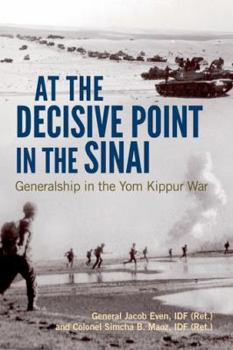At the Decisive Point in the Sinai: Generalship in the Yom Kippur War
(Part of the Foreign Military Studies Series and AUSA Books – Foreign Military Studies Series)
The Yom Kippur War pitted Israel against Syria in the north and Egypt in the south in October 1973. Caught by surprise and surrounded by enemies, Israel relied on the flexibility and creative thinking of its senior field commanders. After Israeli forces halted the Egyptian troops on the Sinai Peninsula, Major General Ariel Sharon seized the opportunity to counterattack. He split the Egyptian army and cut off its supply lines in a maneuver known as Operation Stouthearted Men. Sharon's audacious, controversial decision defied his superiors and produced a major victory, which many believe helped win the war for Israel.
At the Decisive Point in the Sinai is a firsthand account of the Yom Kippur War's most intense engagement by key leaders in Sharon's division. Jacob Even, deputy division commander of the 143rd Division, and Simcha Maoz, a staff officer, recount the initial stages of the Suez crossing, examine the Israel Defense Forces' (IDF) response to Egypt's surprise attack, and explain Sharon's role in the transition from defense to offense. They detail Sharon's struggle to convince his superiors of his plan and argue that an effective division commander is revealed not only by his leadership of subordinates, but also by his ability to influence his senior officers.
The strategic failure of the Israeli high command during the Yom Kippur War has been widely studied, but At the Decisive Point in the Sinai is one of the few works to examine the experiences of field-level commanders. Even and Maoz challenge students of military leadership by offering a case study on effective generalship.
Related Subjects
History




